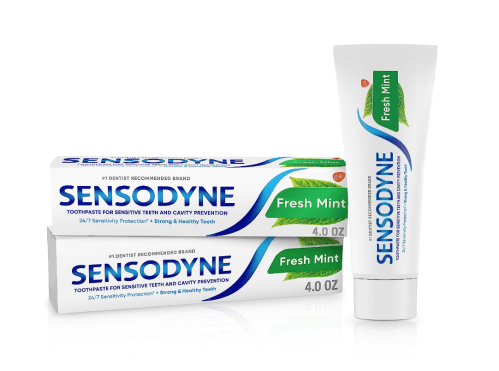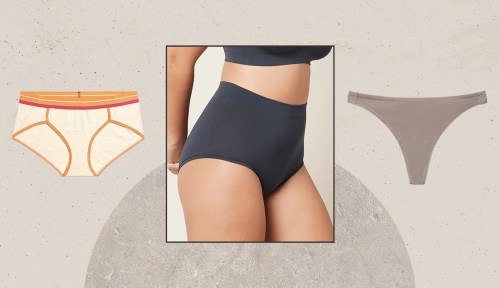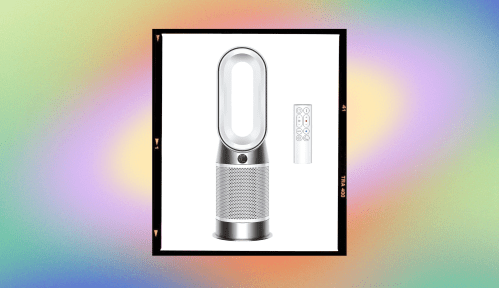Here’s Why Your Teeth Might Be More Sensitive in the Summer—And the 3 Things You Can Do About It
Do you notice your teeth are more sensitive in the summer? Learn about hot and cold tooth sensitivity, from a dental expert.

For most of us, summer is the season of vacations, warm weather, and time outdoors. However, for some folks, they face a dreaded season of increased teeth sensitivity. In fact, 11.5 percent of the population suffers from dentin hypersensitivity, according to research from the Journal of Dentistry, and this number may even be higher when undiagnosed cases are factored in. For some, the summer is the time of year that symptoms are most apparent.
Experts in This Article
registered dental hygienist and founder of Youtube channel, Teeth Talk Girl and TeethTalkGirl.com
What is teeth sensitivity?
A big player in tooth sensitivity is gum recession, which happens when your gums have pulled away from your tooth, exposing your root surface, explains Whitney DiFoggio, BS, RDH, better known as Teeth Talk Girl. “When your root surface is exposed, the dentin tubules on your tooth (similar to the pores on your face) are open, so they feel extra sensations when touched by a typically cold stimulus.”
Each of the tiny pore-like tubules house small nerve endings that run through the different layers of the tooth. When something stimulates them, it causes an uncomfortable sensation.
“Beyond gum recession, enamel erosion, orthodontics, large fillings, new crowns, and even teeth whitening, can also cause sensitivity,” adds the registered dental hygienist. Fortunately, it’s generally something that comes and goes, and rarely lingers or lasts a long time.
Why are our teeth more sensitive in summer?
Summer months can trigger sensitive teeth simply based on what we typically eat and drink— ice cream, popsicles, cold drinks, and all those delicious cool treats we don’t have as often when temps are lower.
“In addition, dehydration is more likely to occur in the summer, which means less saliva, leading to higher chances of bacteria overgrowth,” says DiFoggio.
And beyond our daily food and beverage consumption, many of us add routines like whitening our teeth for that “perfect summer smile,” particularly since it’s the season of weddings, graduations, and Instagram-worthy vacations. This can play a big role in sensitivity too.
Dealing with tooth sensitivity? Here are 3 ways to combat it
Scale back teeth whitening and cold food and drinks
37 million Americans used teeth whiteners in 2020, according to Statista. And the trend is set to continue with the cosmetic tooth bleaching market expected to increase by $941 million from 2021 to 2026.
Beyond limiting cold food and drink consumption, DiFoggio encourages teeth whitening fans to cut it down and perhaps even ask their dental provider for a different concentration of whitening products if they’re feeling increased sensitivity. “Whether you have gum recession or not, be sure to scale back or stop using any type of whitening products, including whitening toothpaste, as it only makes your teeth more sensitive,” she warns.
Use sensitivity-relief products
Saying no to that delicious gelato scoop on a hot summer’s day can be hard, so using sensitivity-relief toothpaste and products may help. “These toothpastes work by clogging the dentin tubules,” says DiFoggio.
How do you know if it will actually work? She suggests looking for the working ingredients of stannous fluoride and potassium nitrate when purchasing products that say they help with sensitivity. “I always tell my patients to make sure they have at least one of those ingredients, and that they don’t contain whitening additives like peroxide,” DiFoggio says.

Sensodyne Fresh Mint Sensitive Toothpaste — $12.00
$12 for a two-pack of 4 ounce tubes
This ADA-approved toothpaste includes both stannous fluoride and potassium nitrate as active ingredients.
ThirdLove Just Launched Bras That Help Balance Your Body Temperature—Here’s Why That’s a Game-Changer for Women in All Life Stages

These Are the Only Types of Underwear You Should Be Wearing, According to Gynecologists

These Are the Summer Essentials You Should Bring With You Every Time You Leave the House, According to a Derm and an RD

Request a flouride treatment
So you’ve cut out cold food and beverages, and switched from whitening to sensitivity-friendly products. If you’re still experiencing pain, it may be time to book an appointment with your dental office.
“Some dentists offer fluoride varnish treatments that can provide months of sensitivity relief, and they can also prescribe a prescription-strength toothpaste,” says DiFoggio.
But most importantly, booking that appointment will help rule out anything else that might be causing your pain. “Sensitivity is typically caused by gum recession,” she says, “but checking in with your dentist will is the best way to ensure it’s nothing more serious.”
Get a checkup
It’s always a good idea to bring up tooth sensitivity (or any mouth issues, for that matter) with your dentist, so they can rule out any serious conditions (like a tooth infection) and help you make a plan to effectively treat the issue.
Sign up for the Well+Good SHOP Newsletter
Get exclusive deals on wellness, beauty, fitness, and food products that have been hand-picked by our editors.
Got it, you've been added to our email list.







